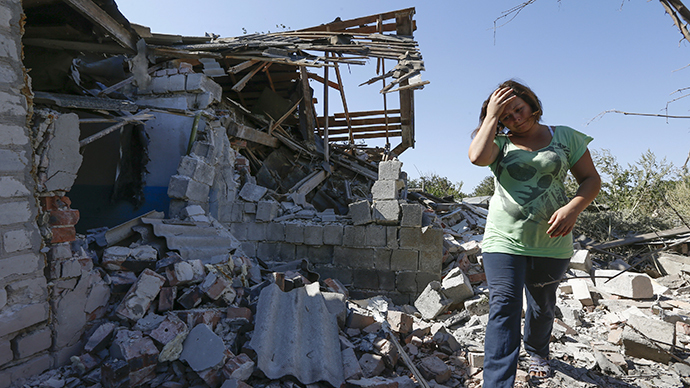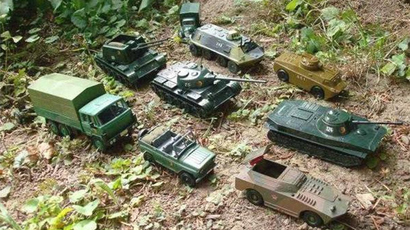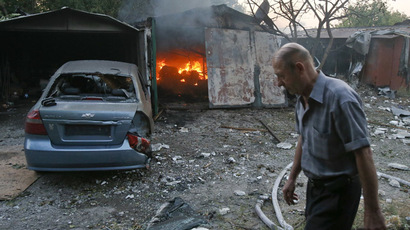Ukraine’s killing fields in 10 stories: RT reporter goes to Lugansk and Donetsk

Lugansk and Donetsk residents are now used to gunfire. RT’s Maria Finoshina crossed Ukraine’s southeast to see the aftermath of war there - and how it is the civilians who have carried the heaviest burden: relatives lost, homes destroyed, and hope gone.
‘Why is this happening? Why, God, why?’
“I worked all my life and what did I get for it,” exclaims a weeping elderly woman. “Why is this happening? Why, God, why?” Many of those left in the besieged city of Lugansk are either elderly or too sick to leave the frontline.
‘What should we do? Die?’
The population of the city of Lugansk has to live amid non-stop bombardment.
“Half the population fled - and what should those of us left do?” asks a local woman. “I don’t have anything, no water, no electricity… nothing!”
‘Life just stopped for us’
“Life just stopped for us,” Valentina Lazareva, a Lugansk resident, told RT’s Maria Finoshina. “We wake up, stand in the bread line for two hours, then get water. And then we cook a meal to eat, and the same thing happens every day.”
Valentina sent her daughter and granddaughter to family friends in Russia a month ago. Now she realizes she has to leave almost all of their possessions behind and flee, and try to get her life back.
13yo child: 'And then glass started flying'
People in Lugansk are afraid to go out because attacks are becoming more and more frequent; they prefer to stay in bomb shelters. There is a shelter in almost every household: it looks like an apartment, but underground.
“I was really scared when the glass started flying. I’m still scared,” 13-year-old Artyom told RT.
'The Ukrainian army is supposed to protect us but it is shelling us’
“We are so sick and tired of all this, we want to live like we lived before… I could never imagine this happening,” a local resident told RT. She is sitting in a Soviet-era bomb shelter built during the Cold War. But until now, it hasn’t been used.
“This is the Ukrainian army that is supposed to protect us, and it’s shelling its own citizens,” says a mother of a 5-year-old boy.
'Let us live well, like we used to live. There is no need for war’
That’s what a local woman told RT. Lugansk urgently requires food, medicine, and medical equipment.
“My mom is diabetic and has hypertension – and she can’t get her medicine,” another woman says.
‘Why are people being killed?’
“They bombed us, the windows were shattered – in my house and over there, too. Everything was burning,” says a distraught elderly woman from the city of Donetsk. “Dear God, when is this going to end? Why are people being killed?” she asks.
Donetsk is yet another hot spot in eastern Ukraine. The situation in the city is referred to as “tense” by the city authorities as Ukrainian troops shell residential areas, schools and hospitals.
‘One person died near the school’
“All this crazy bombing of residential areas. You can take a look. One person died near the school. Why are they doing this?” demands a local man. He had come under fire from Kiev forces while traveling with his family.
‘When will this end?’
“They’ve cut off us from everything. There is nothing left and there is nothing for the children,” exclaimed one Lugansk resident. “When will this end?”
Lugansk was plunging headlong into a humanitarian crisis before Russia’s aid reached it. The city was without water and electricity for weeks, and on top of water shortages, food was scarce.
‘There's hardly anything left to bomb’
Lugansk is facing a serious humanitarian crisis since most of the shops are closed and no deliveries of food, medical supplies, or fuel were able to take place before Russia’s humanitarian aid arrived in the besieged city.
“People are running out of money. How are we supposed to survive in this heat? What if some sort of epidemic breaks out? What should we do?” local woman, Nadezhda Essaulinka, exclaimed, emotionally.
The ceasefire agreed by Kiev and the rebels on Friday may bring one last ray of hope to the devastated regions, while the Russian and Ukrainian leadership is talking of sending another humanitarian cargo to the south-east.
Since the conflict in Ukraine significantly deteriorated in mid-April, 2,593 people have died in fighting in the east of the country, while over 6,033 have been wounded. According to the UN, the number of internally displaced Ukrainians has reached 260,000, with another 814,000 finding refuge in Russia.














